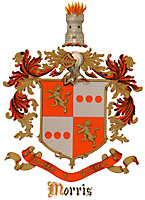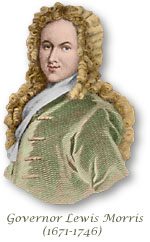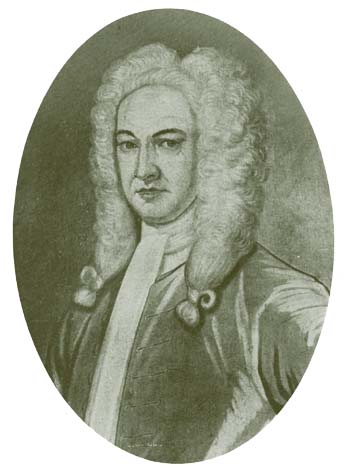Shonard and Spooner's History of Westchester County, NY, National Cyclopedia of
American Biography
Much of his career
[Lewis Morris, Jr., fourth proprietor, second Lord of the Manor of Morrisania]
was contemporary with that of his father, whose political principles he shared. He was one of the
foremost men before the Revolution. His principal offices were Judge of the High Court
of the Admiralty of New York, with jurisdiction voer New Jersey and Connecticut, and Judge of the Court of
Ayer and Terminer. He is said to have strongly resembled his grandfather, James Graham, whom
Mrs. Lamb in her History of the City of New York calls 'a fair sample of the ancient nobility.'
Abstracts of Wills Vol VI 1760-1766
-In the name of God, Amen. I, LEWIS MORRIS, of Morrisania, "Considering the
Evil Consequences of Dying Intestate, and that the Disposition of an estate by Will is one of
the most important Acts of a man's Life, I have therefore thought proper to take the
advantage of that season of Health and Serenity of mind which, by God's favour, I now
enjoy, to make this my last Will and Testament, Which to obviate all disputes and
contentions I have endeavored to express myself in the plainest Language."
My Body I desire
to be laid in the Family Vault at Morrisania, next to those of my father and mother, with as
little Pomp and show as my executors may think proper. My
debts and funeral charges are to be first paid.
I devise that part of Morrisania to the
westward of the Mill Brook to my son, Lewis Morris, and his heirs and assigns, and that it
operate as a confirmation of the Deed or Deeds I have already given him for the same in fee
simple.
The remaining part of Morrisania, being the farm whereon I now live, lying east of
the Mill Brook, together with the Mill Brook and stream leading from Broncks Kill to the
Grist mill, standing on said Mill Brook, to the head thereof, I devise to my beloved wife,
Sarah Morris, during her life. The stock of negroes, Horses and cattle, and farming utensils
on said farm, and all my plate, money, household furniture, Coach, Chariot, and Chaise, and
all the income of said farm, I leave to my wife during her life, to enable her to bring up and
educate those children I have and may have by her.
That part of Morrisania which I have
left to my wife I leave after her decease to my son, Staats Long Morris, if he survives her,
and to his heirs and assigns. And he is to pay to my executors 7,000 within fifteen months
after the death of my wife. But if he be out of the Province, in England, then to be paid
within two years.
Immediately after the receipt of the same my executors shall pay to my son,
Richard Morris, 2,000, To my son, Gouverneur Morris, 2,000, To my daughter Mary, wife
of Thomas Lawrence, 600, To my daughter Isabella 600, To my daughter Sarah 600,
To my daughter Euphemia 600, and to my daughter Catharine 600. If my son, Staats
Long Morris, should not survive my wife, or if he refuses to pay the said sum, then that part
of my estate is left to my son Richard on the same conditions. If neither son should survive,
then to my son, Gouverneur Morris, and if all my said sons die without issue, then to my
eldest son, Lewis Morris.
The two lots which I lately purchased lying in the Broadway in New
York, one being part of the estate of Joseph Murray, Esq., and the other part of the estate of
Stephen Van Cortlandt, And whereas David Ogden has made a joint urchase with me of a tract of land upon Passaic river, in New Jersey, from Samuel Burge, of
Philadelphia, These several parcels I devise to my wife during her life, empowering her to
dispose of the same among her children as she thinks proper.
The pictures of my father and
mother I bequeath to my brother, Robert Hunter Morris, Esq. And my own picture and my
wife's I leave to my daughter Isabella.
All the rest of my real estate I direct to be sold by my
executors and the proceeds paid to my wife, who is to divide the same among my daughters,
Mary Lawrence, Isabella, Sarah, Euphemia, and Catharine, and my sons, Staats Long,
Richard, and Gouverneur. After the death of my wife my executors are to sell the personal
property and divide the proceeds among my children.
My wife having signed an Instrument
before our marriage, dated November 3, 1746, by which she gave her niece, Johana Hall,
200, and I having received all the money belonging to my wife, I bequeath 200 to the
said Johana and also a negro girl." (The will disposes of various negro slaves, 12 being
named, and several others, including one "bought of my brother-in-law, James Graham,"
among his children.) My Coach and the silver tankard given to me by the Colony of Rhode
Island I leave to my son, Lewis Morris, Also my Library, agreeable with my father's design
of passing it with the estate. But all such books as I have added to it are for my son Richard,
and in the catalogue are marked with the letter P. "And of the remainder my son Richard is
to have the joint use of them while he continues to practice the Law. But none of the books
are to be removed from Morrisania, and none of the books are to be loaned out of the Library to any person."
Differences arising in families are allways attended with the worst consequences; therefore
it is my desire that all my children use their best endeavours to cultivate a good
understanding with each other, and be dutiful to their mother, who, although she is a
mother-in-law (stepmother) to some of them, has done them equal justice.
My actions have been so inconsiderable in the World that the most durable monument would but perpetuate my Folly while it lasts. My desire is that nothing be mentioned about me, not so much as a single line in a News Paper to tell the World I am dead." "What is left to my children is honestly
acquired, which gives me satisfaction that ill-gotten thousands cannot bestow." "My eldest
son may be persuaded not to suffer my wife's bones to be buried in the vault at Old
Morrisania, or remove her remains after they have been laid there. In case he should, it is
my request that my bones be also removed and laid in some ground in any part of Morrisania
east of the Mill Brook.
It is my desire that my son, Gouverneur Morris, may have the best
education that is to be had in Europe or America, but my express will and directions are that
he be never sent for that purpose to the Colony of Connecticutt, lest he should imbibe in his
youth that low craft and cunning so incident to the People of that Colony, which is so
interwoven in their Constitutions that all their art cannot disguise it from the World; though
many of them, under the sanctified garb of Religion, have endeavored to impose themselves
on the World for honest men.
I make my wife and my brother, Robert Hunter Morris, my
son Richard, and my friend, William Smith, Jr., executors. Dated November 19, 1760.
Witnesses, Francis Lewis, Samuel Gilford, Stephen Sayre. Proved, August 5, 1762.
Confirmed by Governor Monckton, August 28, 1762.



 Copyright © 2002, Mary S. Van Deusen
Copyright © 2002, Mary S. Van Deusen


